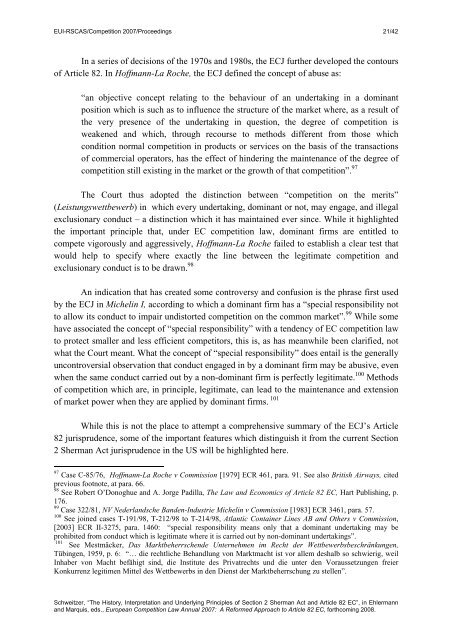The History, Interpretation and Underlying Principles of Section
The History, Interpretation and Underlying Principles of Section
The History, Interpretation and Underlying Principles of Section
You also want an ePaper? Increase the reach of your titles
YUMPU automatically turns print PDFs into web optimized ePapers that Google loves.
EUI-RSCAS/Competition 2007/Proceedings 21/42<br />
In a series <strong>of</strong> decisions <strong>of</strong> the 1970s <strong>and</strong> 1980s, the ECJ further developed the contours<br />
<strong>of</strong> Article 82. In H<strong>of</strong>fmann-La Roche, the ECJ defined the concept <strong>of</strong> abuse as:<br />
“an objective concept relating to the behaviour <strong>of</strong> an undertaking in a dominant<br />
position which is such as to influence the structure <strong>of</strong> the market where, as a result <strong>of</strong><br />
the very presence <strong>of</strong> the undertaking in question, the degree <strong>of</strong> competition is<br />
weakened <strong>and</strong> which, through recourse to methods different from those which<br />
condition normal competition in products or services on the basis <strong>of</strong> the transactions<br />
<strong>of</strong> commercial operators, has the effect <strong>of</strong> hindering the maintenance <strong>of</strong> the degree <strong>of</strong><br />
competition still existing in the market or the growth <strong>of</strong> that competition”. 97<br />
<strong>The</strong> Court thus adopted the distinction between “competition on the merits”<br />
(Leistungswettbewerb) in which every undertaking, dominant or not, may engage, <strong>and</strong> illegal<br />
exclusionary conduct – a distinction which it has maintained ever since. While it highlighted<br />
the important principle that, under EC competition law, dominant firms are entitled to<br />
compete vigorously <strong>and</strong> aggressively, H<strong>of</strong>fmann-La Roche failed to establish a clear test that<br />
would help to specify where exactly the line between the legitimate competition <strong>and</strong><br />
exclusionary conduct is to be drawn. 98<br />
An indication that has created some controversy <strong>and</strong> confusion is the phrase first used<br />
by the ECJ in Michelin I, according to which a dominant firm has a “special responsibility not<br />
to allow its conduct to impair undistorted competition on the common market”. 99 While some<br />
have associated the concept <strong>of</strong> “special responsibility” with a tendency <strong>of</strong> EC competition law<br />
to protect smaller <strong>and</strong> less efficient competitors, this is, as has meanwhile been clarified, not<br />
what the Court meant. What the concept <strong>of</strong> “special responsibility” does entail is the generally<br />
uncontroversial observation that conduct engaged in by a dominant firm may be abusive, even<br />
when the same conduct carried out by a non-dominant firm is perfectly legitimate. 100 Methods<br />
<strong>of</strong> competition which are, in principle, legitimate, can lead to the maintenance <strong>and</strong> extension<br />
<strong>of</strong> market power when they are applied by dominant firms. 101<br />
While this is not the place to attempt a comprehensive summary <strong>of</strong> the ECJ’s Article<br />
82 jurisprudence, some <strong>of</strong> the important features which distinguish it from the current <strong>Section</strong><br />
2 Sherman Act jurisprudence in the US will be highlighted here.<br />
97<br />
Case C-85/76, H<strong>of</strong>fmann-La Roche v Commission [1979] ECR 461, para. 91. See also British Airways, cited<br />
previous footnote, at para. 66.<br />
98<br />
See Robert O’Donoghue <strong>and</strong> A. Jorge Padilla, <strong>The</strong> Law <strong>and</strong> Economics <strong>of</strong> Article 82 EC, Hart Publishing, p.<br />
176.<br />
99<br />
Case 322/81, NV Nederl<strong>and</strong>sche B<strong>and</strong>en-Industrie Michelin v Commission [1983] ECR 3461, para. 57.<br />
100<br />
See joined cases T-191/98, T-212/98 to T-214/98, Atlantic Container Lines AB <strong>and</strong> Others v Commission,<br />
[2003] ECR II-3275, para. 1460: “special responsibility means only that a dominant undertaking may be<br />
prohibited from conduct which is legitimate where it is carried out by non-dominant undertakings”.<br />
101<br />
See Mestmäcker, Das Marktbeherrschende Unternehmen im Recht der Wettbewerbsbeschränkungen,<br />
Tübingen, 1959, p. 6: “… die rechtliche Beh<strong>and</strong>lung von Marktmacht ist vor allem deshalb so schwierig, weil<br />
Inhaber von Macht befähigt sind, die Institute des Privatrechts und die unter den Voraussetzungen freier<br />
Konkurrenz legitimen Mittel des Wettbewerbs in den Dienst der Marktbeherrschung zu stellen”.<br />
Schweitzer, “<strong>The</strong> <strong>History</strong>, <strong>Interpretation</strong> <strong>and</strong> <strong>Underlying</strong> <strong>Principles</strong> <strong>of</strong> <strong>Section</strong> 2 Sherman Act <strong>and</strong> Article 82 EC”, in Ehlermann<br />
<strong>and</strong> Marquis, eds., European Competition Law Annual 2007: A Reformed Approach to Article 82 EC, forthcoming 2008.

















